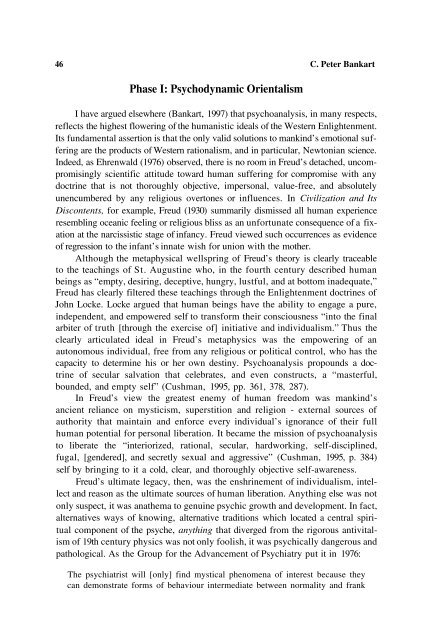Psychology & Buddhism.pdf
Psychology & Buddhism.pdf
Psychology & Buddhism.pdf
Create successful ePaper yourself
Turn your PDF publications into a flip-book with our unique Google optimized e-Paper software.
46 C. Peter Bankart<br />
Phase I: Psychodynamic Orientalism<br />
I have argued elsewhere (Bankart, 1997) that psychoanalysis, in many respects,<br />
reflects the highest flowering of the humanistic ideals of the Western Enlightenment.<br />
Its fundamental assertion is that the only valid solutions to mankind’s emotional suffering<br />
are the products of Western rationalism, and in particular, Newtonian science.<br />
Indeed, as Ehrenwald (1976) observed, there is no room in Freud’s detached, uncompromisingly<br />
scientific attitude toward human suffering for compromise with any<br />
doctrine that is not thoroughly objective, impersonal, value-free, and absolutely<br />
unencumbered by any religious overtones or influences. In Civilization and Its<br />
Discontents, for example, Freud (1930) summarily dismissed all human experience<br />
resembling oceanic feeling or religious bliss as an unfortunate consequence of a fixation<br />
at the narcissistic stage of infancy. Freud viewed such occurrences as evidence<br />
of regression to the infant’s innate wish for union with the mother.<br />
Although the metaphysical wellspring of Freud’s theory is clearly traceable<br />
to the teachings of St. Augustine who, in the fourth century described human<br />
beings as “empty, desiring, deceptive, hungry, lustful, and at bottom inadequate,”<br />
Freud has clearly filtered these teachings through the Enlightenment doctrines of<br />
John Locke. Locke argued that human beings have the ability to engage a pure,<br />
independent, and empowered self to transform their consciousness “into the final<br />
arbiter of truth [through the exercise of] initiative and individualism.” Thus the<br />
clearly articulated ideal in Freud’s metaphysics was the empowering of an<br />
autonomous individual, free from any religious or political control, who has the<br />
capacity to determine his or her own destiny. Psychoanalysis propounds a doctrine<br />
of secular salvation that celebrates, and even constructs, a “masterful,<br />
bounded, and empty self” (Cushman, 1995, pp. 361, 378, 287).<br />
In Freud’s view the greatest enemy of human freedom was mankind’s<br />
ancient reliance on mysticism, superstition and religion - external sources of<br />
authority that maintain and enforce every individual’s ignorance of their full<br />
human potential for personal liberation. It became the mission of psychoanalysis<br />
to liberate the “interiorized, rational, secular, hardworking, self-disciplined,<br />
fugal, [gendered], and secretly sexual and aggressive” (Cushman, 1995, p. 384)<br />
self by bringing to it a cold, clear, and thoroughly objective self-awareness.<br />
Freud’s ultimate legacy, then, was the enshrinement of individualism, intellect<br />
and reason as the ultimate sources of human liberation. Anything else was not<br />
only suspect, it was anathema to genuine psychic growth and development. In fact,<br />
alternatives ways of knowing, alternative traditions which located a central spiritual<br />
component of the psyche, anything that diverged from the rigorous antivitalism<br />
of 19th century physics was not only foolish, it was psychically dangerous and<br />
pathological. As the Group for the Advancement of Psychiatry put it in 1976:<br />
The psychiatrist will [only] find mystical phenomena of interest because they<br />
can demonstrate forms of behaviour intermediate between normality and frank











